Climate & Environment
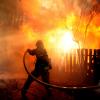 Current wildfire policy can’t adequately protect people, homes and ecosystems from the longer, hotter fire seasons, new CU Boulder research has found.
Current wildfire policy can’t adequately protect people, homes and ecosystems from the longer, hotter fire seasons, new CU Boulder research has found.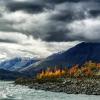 The retreat of a massive Yukon glacier a mile up its valley has redirected meltwater from one river basin to another in the first modern case of "river piracy," according to a new analysis co-authored by CU Boulder researchers.
The retreat of a massive Yukon glacier a mile up its valley has redirected meltwater from one river basin to another in the first modern case of "river piracy," according to a new analysis co-authored by CU Boulder researchers.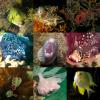 Robert Colwell, adjoint curator in entomology at the Museum of Natural History on campus, has a paper published today in Methods in Ecology and Evolution on using novel mathematical approaches to estimate the number of fish species on coral reefs. We caught up with him to discuss his lifelong fascination with the Earth’s biodiversity, and his latest research, which could be applied to any species.
Robert Colwell, adjoint curator in entomology at the Museum of Natural History on campus, has a paper published today in Methods in Ecology and Evolution on using novel mathematical approaches to estimate the number of fish species on coral reefs. We caught up with him to discuss his lifelong fascination with the Earth’s biodiversity, and his latest research, which could be applied to any species.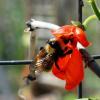 None of the 22 native species of bumblebees in Boulder County showed declines over a recent five-year period, according to a new CU Boulder study. Two species previously believed to be disappearing were present in several locations. "It shows that Boulder County is doing something right," the study authors say.
None of the 22 native species of bumblebees in Boulder County showed declines over a recent five-year period, according to a new CU Boulder study. Two species previously believed to be disappearing were present in several locations. "It shows that Boulder County is doing something right," the study authors say. Arctic sea ice was at a record low maximum extent for the third straight year, according to scientists at the National Snow and Ice Data Center (NSIDC) and NASA.
Arctic sea ice was at a record low maximum extent for the third straight year, according to scientists at the National Snow and Ice Data Center (NSIDC) and NASA.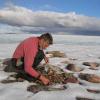 A new study on Baffin Island in the Canadian Arctic shows that the Barnes Ice Cap, the last remnant of the ice sheet that once blanketed much of North America, will disappear in a few hundred years.
A new study on Baffin Island in the Canadian Arctic shows that the Barnes Ice Cap, the last remnant of the ice sheet that once blanketed much of North America, will disappear in a few hundred years.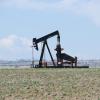 Older vertical oil and gas wells are more likely to cause groundwater contamination than newer wells, new CU Boulder research shows.
Older vertical oil and gas wells are more likely to cause groundwater contamination than newer wells, new CU Boulder research shows.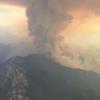 Humans have dramatically increased the spatial and seasonal extent of wildfires across the U.S. in recent decades and ignited more than 840,000 blazes over a 21-year period, according to new University of Colorado Boulder-led research.
Humans have dramatically increased the spatial and seasonal extent of wildfires across the U.S. in recent decades and ignited more than 840,000 blazes over a 21-year period, according to new University of Colorado Boulder-led research.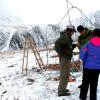 Thanks to a six-year $6.8 million renewal grant, decades-long data collection will continue on Niwot Ridge. It is the only site of its kind on the continent comprising alpine and sub-alpine environments, and CU Boulder researchers sometimes brave harsh weather conditions to get there.
Thanks to a six-year $6.8 million renewal grant, decades-long data collection will continue on Niwot Ridge. It is the only site of its kind on the continent comprising alpine and sub-alpine environments, and CU Boulder researchers sometimes brave harsh weather conditions to get there.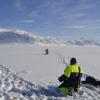 Dust released by an active coal mine in Svalbard, Norway, reduced the spectral reflectance of nearby snow and ice by up to 84 percent, according to new University of Colorado Boulder-led research.
Dust released by an active coal mine in Svalbard, Norway, reduced the spectral reflectance of nearby snow and ice by up to 84 percent, according to new University of Colorado Boulder-led research.


